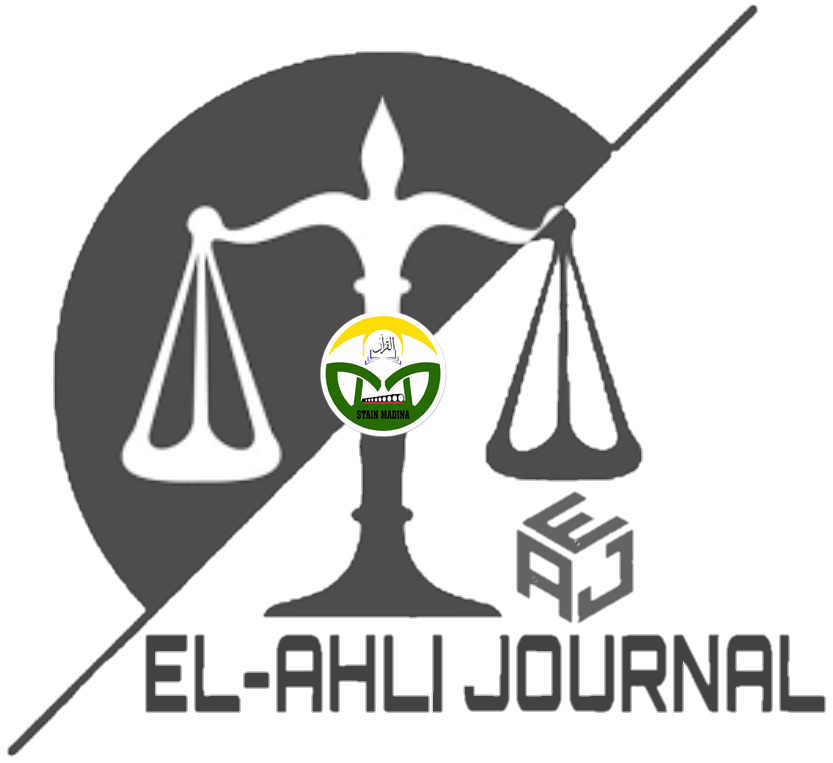Hermeneutika Kritis Khaled M. Abou El Fadl dalam Rekonstruksi Hukum Islam (Studi Analisis Fikih Otoriter menjadi Otoritatif)
DOI:
https://doi.org/10.56874/el-ahli.v2i1.478Kata Kunci:
Hermeneutika, Hukum Islam, OtoritatifAbstrak
Abstrak
Hukum Islam merupakan hasil pemikiran seseorang dalam memahami teks yang terdapat dalam al-Qur’an dan Hadist yang memungkinkan untuk dilakukan kritik dan interpretasi ulang. Ulama melakukan reinterpretasi terhadap pemahaman hukum Islam untuk menghasilkan hukum yang lebih relevan dengan perkembangan zaman. Hermeneutika merupakan metode yang digunakan oleh beberapa ulama atau cendikiawan muslim dalam memahami hukum Islam sehingga melahirkan sebuah pemahaman hukum Islam yang otoritatif. Fikih otoritatif merupakan sebuah pandangan hukum Islam yang responsif dan dinamis yang terbuka untuk dikritisi atau direformasi ulang sesuai dengan perkembangan zaman.
Kata Kunci: Hermeneutika, Hukum Islam, Otoritatif.
Abstract
Islamic law is a reinterpretation in understanding the texts considered in the Qur'an and Hadith which allows for criticism and reinterpretation. Reinterpretasion of ulama to understanding Islamic law to produce laws that are more relevant to the times. Hermeneutics is a method used by ulama or muslim scholar in understanding Islamic law so as to give birth to an authoritative understanding of Islamic law. Authoritative fiqh is a responsive and dynamic view of Islamic law that is open to criticism or reformation in accordance with the times.
Key Words: Hermeneutika, Islamic Law, Otoritatif.
Unduhan
Diterbitkan
Cara Mengutip
Terbitan
Bagian
Lisensi
All articles published in EL-AHLI: Jurnal Hukum Keluarga Islam are licensed under a Creative Commons Attribution-ShareAlike 4.0 International License (CC BY-SA 4.0).
Under this license, authors and readers are free to:
-
Share — copy and redistribute the material in any medium or format.
-
Adapt — remix, transform, and build upon the material for any purpose, even commercially.
Under the following terms:
-
Attribution — You must give appropriate credit, provide a link to the license, and indicate if changes were made. You may do so in any reasonable manner but not in any way that suggests the licensor endorses you or your use.
-
ShareAlike — If you remix, transform, or build upon the material, you must distribute your contributions under the same license as the original.
Copyright and Licensing Policy:
-
The author retains copyright and grants the journal the right of first publication with the work simultaneously licensed under the Creative Commons Attribution-ShareAlike 4.0 International License, which allows others to share the work with acknowledgment of the work’s authorship and initial publication in this journal.
-
Authors are allowed to enter into separate, additional contractual arrangements for the non-exclusive distribution of the journal's published version of the work (e.g., post it to an institutional repository or publish it in a book), with an acknowledgment of its initial publication in this journal.
Link to License:
https://creativecommons.org/licenses/by-sa/4.0/





